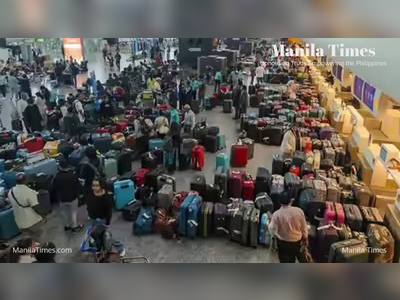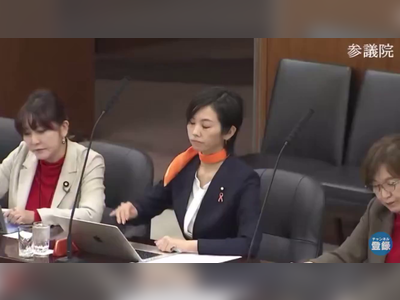Manila Times
Upholding Truth. Empowering the Philippines
Sunday, Dec 07, 2025
The Nation's Story is Told with Honor
Filipinos Linked to Growing Online Scam Operations
Authorities report a significant rise in the involvement of Filipinos in sophisticated online fraud schemes following recent arrests in Cebu.
Authorities in the Philippines have identified an alarming trend in which Filipinos are increasingly being used as primary operatives in sophisticated online scam operations.
This was underscored by a recent raid in Lapu-Lapu City, which resulted in the detention of 29 Filipino individuals alongside two Taiwanese nationals who were allegedly supervising their activities.
The National Bureau of Investigation (NBI) 7, led by Director Rennan Augustus Oliva, confirmed the details during a press briefing on June 6, 2025, following the raid that took place on June 4 at Vistamar Subdivision in Barangay Mactan.
The operation was executed under three search warrants issued by Judge Ramon Daomillas Jr. of the Regional Trial Court in Cebu City.
According to Oliva, the arrests mark a notable shift in the composition of scam operations, which previously were predominantly managed by foreign nationals.
The Filipino operatives, who ranged in gender, were found working at individual stations, engaging in various illegal online scamming activities targeting both local and international victims.
“Now the majority of the agents or workers are Filipinos,” said Oliva, indicating a trend that raises concerns about local involvement in these criminal enterprises.
The operation was largely supported by the Naval Intelligence Security Group, which had spent approximately three and a half months conducting verification and surveillance leading up to the raid.
Red flags were raised during the investigation due to the absence of necessary business permits, particularly in light of a recent government crackdown on Philippine Offshore Gaming Operators.
The two Taiwanese nationals arrested, identified as Tsai Chit Ting and Lili Cheng Chi, were allegedly overseeing the operations that had reportedly been ongoing for close to a year.
Their fraudulent schemes included the promotion of fake dating websites utilizing fabricated profiles, operating multiple social media accounts on platforms such as Facebook, WhatsApp, Instagram, and Telegram to lure victims into romance and cryptocurrency scams, and managing a counterfeit e-commerce site mimicking legitimate ones, causing financial losses to consumers when their orders went unfulfilled.
Oliva emphasized that the elaborate designs of these scams made them challenging to detect, but assured the public that the NBI was making strides to dismantle these networks.
As part of the raid, several computer systems used to facilitate these fraudulent activities were confiscated.
Local officials, including Councilor Valentin Baguio, and members of the Lapu-Lapu City Police Office, led by Colonel Dyan Agustin, participated in the inventorying of seized materials.
Following their arrest, the suspects were taken to the Lapu-Lapu City Prosecutor’s Office for inquest proceedings on June 5. Subsequently, criminal complaints were lodged against them under Section 4(b)(2) concerning computer-related fraud, as stipulated in Republic Act 10175, also known as the Cybercrime Prevention Act of 2012. If convicted, they could face imprisonment ranging from six to twelve years and fines totaling no less than 200,000 Philippine pesos.
The investigation remains active, encompassing inquiries into the involvement of both Filipino and foreign individuals.
The Bureau of Immigration has been alerted to investigate any potential previous violations by the foreign nationals involved.
Oliva has also called upon the public to report any suspicious activities indicative of online scams, emphasizing that the identities of whistleblowers will be kept confidential.
In a related incident on May 15, agents from the NBI Central Office arrested 17 Taiwanese nationals in Maria Luisa Estate Park, who were reportedly associated with a 'romance scam' and identified as members of a criminal organization known as the 'Four Seas Gang,' which has been targeting Malaysian and Chinese nationals.
Six of those apprehended had existing warrants for their arrest in Taiwan.
This was underscored by a recent raid in Lapu-Lapu City, which resulted in the detention of 29 Filipino individuals alongside two Taiwanese nationals who were allegedly supervising their activities.
The National Bureau of Investigation (NBI) 7, led by Director Rennan Augustus Oliva, confirmed the details during a press briefing on June 6, 2025, following the raid that took place on June 4 at Vistamar Subdivision in Barangay Mactan.
The operation was executed under three search warrants issued by Judge Ramon Daomillas Jr. of the Regional Trial Court in Cebu City.
According to Oliva, the arrests mark a notable shift in the composition of scam operations, which previously were predominantly managed by foreign nationals.
The Filipino operatives, who ranged in gender, were found working at individual stations, engaging in various illegal online scamming activities targeting both local and international victims.
“Now the majority of the agents or workers are Filipinos,” said Oliva, indicating a trend that raises concerns about local involvement in these criminal enterprises.
The operation was largely supported by the Naval Intelligence Security Group, which had spent approximately three and a half months conducting verification and surveillance leading up to the raid.
Red flags were raised during the investigation due to the absence of necessary business permits, particularly in light of a recent government crackdown on Philippine Offshore Gaming Operators.
The two Taiwanese nationals arrested, identified as Tsai Chit Ting and Lili Cheng Chi, were allegedly overseeing the operations that had reportedly been ongoing for close to a year.
Their fraudulent schemes included the promotion of fake dating websites utilizing fabricated profiles, operating multiple social media accounts on platforms such as Facebook, WhatsApp, Instagram, and Telegram to lure victims into romance and cryptocurrency scams, and managing a counterfeit e-commerce site mimicking legitimate ones, causing financial losses to consumers when their orders went unfulfilled.
Oliva emphasized that the elaborate designs of these scams made them challenging to detect, but assured the public that the NBI was making strides to dismantle these networks.
As part of the raid, several computer systems used to facilitate these fraudulent activities were confiscated.
Local officials, including Councilor Valentin Baguio, and members of the Lapu-Lapu City Police Office, led by Colonel Dyan Agustin, participated in the inventorying of seized materials.
Following their arrest, the suspects were taken to the Lapu-Lapu City Prosecutor’s Office for inquest proceedings on June 5. Subsequently, criminal complaints were lodged against them under Section 4(b)(2) concerning computer-related fraud, as stipulated in Republic Act 10175, also known as the Cybercrime Prevention Act of 2012. If convicted, they could face imprisonment ranging from six to twelve years and fines totaling no less than 200,000 Philippine pesos.
The investigation remains active, encompassing inquiries into the involvement of both Filipino and foreign individuals.
The Bureau of Immigration has been alerted to investigate any potential previous violations by the foreign nationals involved.
Oliva has also called upon the public to report any suspicious activities indicative of online scams, emphasizing that the identities of whistleblowers will be kept confidential.
In a related incident on May 15, agents from the NBI Central Office arrested 17 Taiwanese nationals in Maria Luisa Estate Park, who were reportedly associated with a 'romance scam' and identified as members of a criminal organization known as the 'Four Seas Gang,' which has been targeting Malaysian and Chinese nationals.
Six of those apprehended had existing warrants for their arrest in Taiwan.
AI Disclaimer: An advanced artificial intelligence (AI) system generated the content of this page on its own. This innovative technology conducts extensive research from a variety of reliable sources, performs rigorous fact-checking and verification, cleans up and balances biased or manipulated content, and presents a minimal factual summary that is just enough yet essential for you to function as an informed and educated citizen. Please keep in mind, however, that this system is an evolving technology, and as a result, the article may contain accidental inaccuracies or errors. We urge you to help us improve our site by reporting any inaccuracies you find using the "Contact Us" link at the bottom of this page. Your helpful feedback helps us improve our system and deliver more precise content. When you find an article of interest here, please look for the full and extensive coverage of this topic in traditional news sources, as they are written by professional journalists that we try to support, not replace. We appreciate your understanding and assistance.









